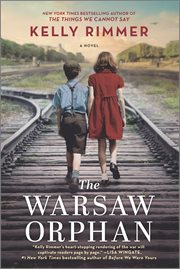Review by Booklist Review
Best-selling Jenoff's latest mesmerizing and meticulous WWII novel, following The Lost Girls of Paris (2019), charts the intersecting lives of two young women. In 1942 in Krakow, 18-year-old Sadie lives in the Jewish quarter, longing for a life beyond the walls of the ghetto. When the Germans arrive to round up the community, Sadie and her parents flee down into the sewers in a harrowing, ultimately devastating escape. Although this was meant to be a temporary hiding place, they are stranded there for weeks, a predicament further complicated by Sadie's mother's pregnancy. After losing her father, well-off Ella, 19, is living in Krakow with her conniving stepmother. One day Ella spies Sadie through a grate in the street, and the two form an unexpected friendship, offering respite from the escalating dangers. As days continue to pass, however, each is forced to make heartbreaking choices. Alternating between Sadie's and Ella's points of view, Jenoff creates a rich drama from her compelling characters' connection, growth, and perseverance despite unimaginable horrors.
From Booklist, Copyright (c) American Library Association. Used with permission.
Review by Publisher's Weekly Review
Jenoff's spellbinding latest (after The Lost Girls of Paris) follows a Jewish family hiding from the Nazis in Kraków, Poland. Famished 18-year-old Sadie Gault's parents insist she hide in a crawl space of their ghetto apartment in 1942, to spare her from grueling forced labor. A year later, facing intensifying raids, the family escapes into the sewer system with help from a worker who explains the tunnels and brings them food. Sadie bonds over books with the 20-something son of another family hiding with them, and their friendship blossoms into romance. Meanwhile, in a parallel narrative, a young Catholic woman named Ella Stepanek dreams of marrying her boyfriend and yearns to flee from her cruel Nazi collaborator stepmother. While running an errand at the market, Ella happens to glance down at a sewer grate in the street and sees Sadie looking up at her. Thus begins a lifesaving friendship in which both young women discover great inner resources neither one knew she possessed. Jenoff drew on a true story for this harrowing narrative, and shapes it with precise details of the subterranean world and of the city's churches, markets, and cafes. This moving tale of young women's will to survive on their own terms will appeal to readers of all ages. Agent: Susan Ginsberg, Writers House. (May)
(c) Copyright PWxyz, LLC. All rights reserved
Review by Kirkus Book Review
In Nazi-occupied Kraków, a friendship between two young women, one Jewish and one Polish, alters the destinies of both. The present-day prologue introduces an unidentified 70-something woman who is visiting Poland, trying to work up the nerve to make contact with a 90-ish Kraków resident. The novel proper alternates the first-person narratives of Sadie Gault and Ella Stepanek, both 19. A mass deportation of Kraków's Jews in 1943 drives Sadie's father to take desperate measures to avoid the camps. With the help of Pawel, a Polish sewer worker, Sadie and her parents escape into Kraków's sewer tunnels, but Sadie's father drowns along the way. To avoid capture, Sadie and her mother--who's pregnant--must hide in a small chamber inside the sewer system along with the Rosenbergs, a more devout family. Meanwhile, Ella's father died defending Poland, and her stepmother, Ana, is now welcoming German officers to Ella's family home (where she lives at Ana's sufferance). Then one day, walking through a market, Ella spots Sadie through a grate, and they make eye contact. She returns the next day, and gradually the acquaintance between the young women warms into friendship. Sewer living gets even more challenging when Pawel, sole source of food and supplies, is arrested. Ella, aided by her resistance fighter boyfriend, smuggles food to the refugees. Sadie and young Saul Rosenberg overcome their religious differences and fall in love. After Sadie's mother gives birth, the infant's wails force the fugitives to make a terrible choice. All these well-drawn characters have too few options, which they debate endlessly and repetitiously. The description of how the sewer dwellers exist for months in a small, bare, filthy space is sketchy. The book's timeline can feel vague--the main action is happening in 1943, but the historical circumstances suggest 1944. There are continuity glitches. At the beginning of the book, Ella notes that her father left no will, but much later, the will turns up with no comment. Contemporary parlance creeps in: "we can do this," "a few months tops." Still, there are gripping scenes, particularly toward the end, and a poignant epilogue. Powerful but in need of a polish. Copyright (c) Kirkus Reviews, used with permission.
Copyright (c) Kirkus Reviews, used with permission.



